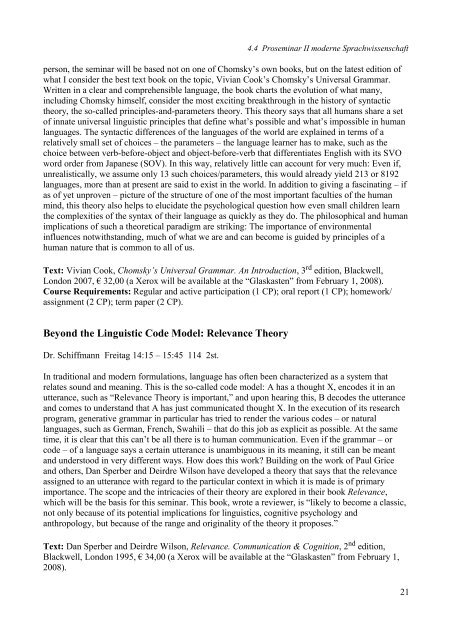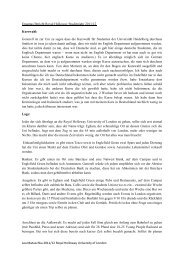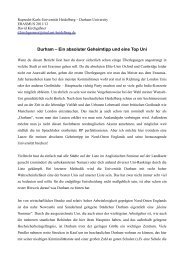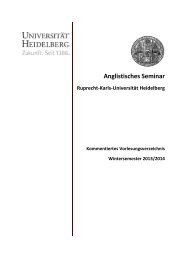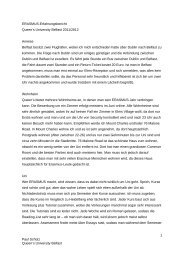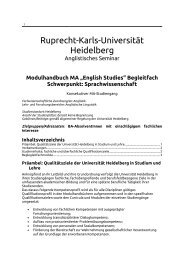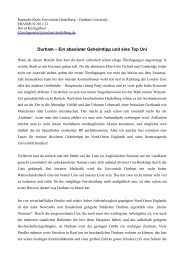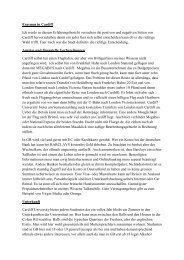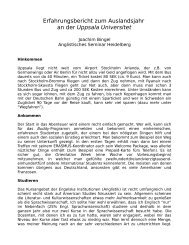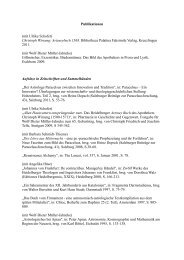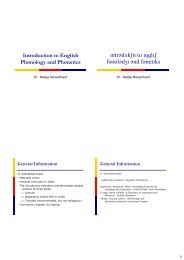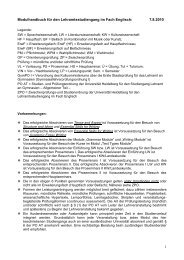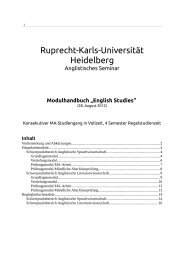Kommentiertes Vorlesungsverzeichnis Anglistik Heidelberg SS 2008
Kommentiertes Vorlesungsverzeichnis Anglistik Heidelberg SS 2008
Kommentiertes Vorlesungsverzeichnis Anglistik Heidelberg SS 2008
Create successful ePaper yourself
Turn your PDF publications into a flip-book with our unique Google optimized e-Paper software.
4.4 Proseminar II moderne Sprachwissenschaft<br />
person, the seminar will be based not on one of Chomsky’s own books, but on the latest edition of<br />
what I consider the best text book on the topic, Vivian Cook’s Chomsky’s Universal Grammar.<br />
Written in a clear and comprehensible language, the book charts the evolution of what many,<br />
including Chomsky himself, consider the most exciting breakthrough in the history of syntactic<br />
theory, the so-called principles-and-parameters theory. This theory says that all humans share a set<br />
of innate universal linguistic principles that define what’s possible and what’s impossible in human<br />
languages. The syntactic differences of the languages of the world are explained in terms of a<br />
relatively small set of choices – the parameters – the language learner has to make, such as the<br />
choice between verb-before-object and object-before-verb that differentiates English with its SVO<br />
word order from Japanese (SOV). In this way, relatively little can account for very much: Even if,<br />
unrealistically, we assume only 13 such choices/parameters, this would already yield 213 or 8192<br />
languages, more than at present are said to exist in the world. In addition to giving a fascinating – if<br />
as of yet unproven – picture of the structure of one of the most important faculties of the human<br />
mind, this theory also helps to elucidate the psychological question how even small children learn<br />
the complexities of the syntax of their language as quickly as they do. The philosophical and human<br />
implications of such a theoretical paradigm are striking: The importance of environmental<br />
influences notwithstanding, much of what we are and can become is guided by principles of a<br />
human nature that is common to all of us.<br />
Text: Vivian Cook, Chomsky’s Universal Grammar. An Introduction, 3 rd edition, Blackwell,<br />
London 2007, € 32,00 (a Xerox will be available at the “Glaskasten” from February 1, <strong>2008</strong>).<br />
Course Requirements: Regular and active participation (1 CP); oral report (1 CP); homework/<br />
assignment (2 CP); term paper (2 CP).<br />
Beyond the Linguistic Code Model: Relevance Theory<br />
Dr. Schiffmann Freitag 14:15 – 15:45 114 2st.<br />
In traditional and modern formulations, language has often been characterized as a system that<br />
relates sound and meaning. This is the so-called code model: A has a thought X, encodes it in an<br />
utterance, such as “Relevance Theory is important,” and upon hearing this, B decodes the utterance<br />
and comes to understand that A has just communicated thought X. In the execution of its research<br />
program, generative grammar in particular has tried to render the various codes – or natural<br />
languages, such as German, French, Swahili – that do this job as explicit as possible. At the same<br />
time, it is clear that this can’t be all there is to human communication. Even if the grammar – or<br />
code – of a language says a certain utterance is unambiguous in its meaning, it still can be meant<br />
and understood in very different ways. How does this work? Building on the work of Paul Grice<br />
and others, Dan Sperber and Deirdre Wilson have developed a theory that says that the relevance<br />
assigned to an utterance with regard to the particular context in which it is made is of primary<br />
importance. The scope and the intricacies of their theory are explored in their book Relevance,<br />
which will be the basis for this seminar. This book, wrote a reviewer, is “likely to become a classic,<br />
not only because of its potential implications for linguistics, cognitive psychology and<br />
anthropology, but because of the range and originality of the theory it proposes.”<br />
Text: Dan Sperber and Deirdre Wilson, Relevance. Communication & Cognition, 2 nd edition,<br />
Blackwell, London 1995, € 34,00 (a Xerox will be available at the “Glaskasten” from February 1,<br />
<strong>2008</strong>).<br />
21


